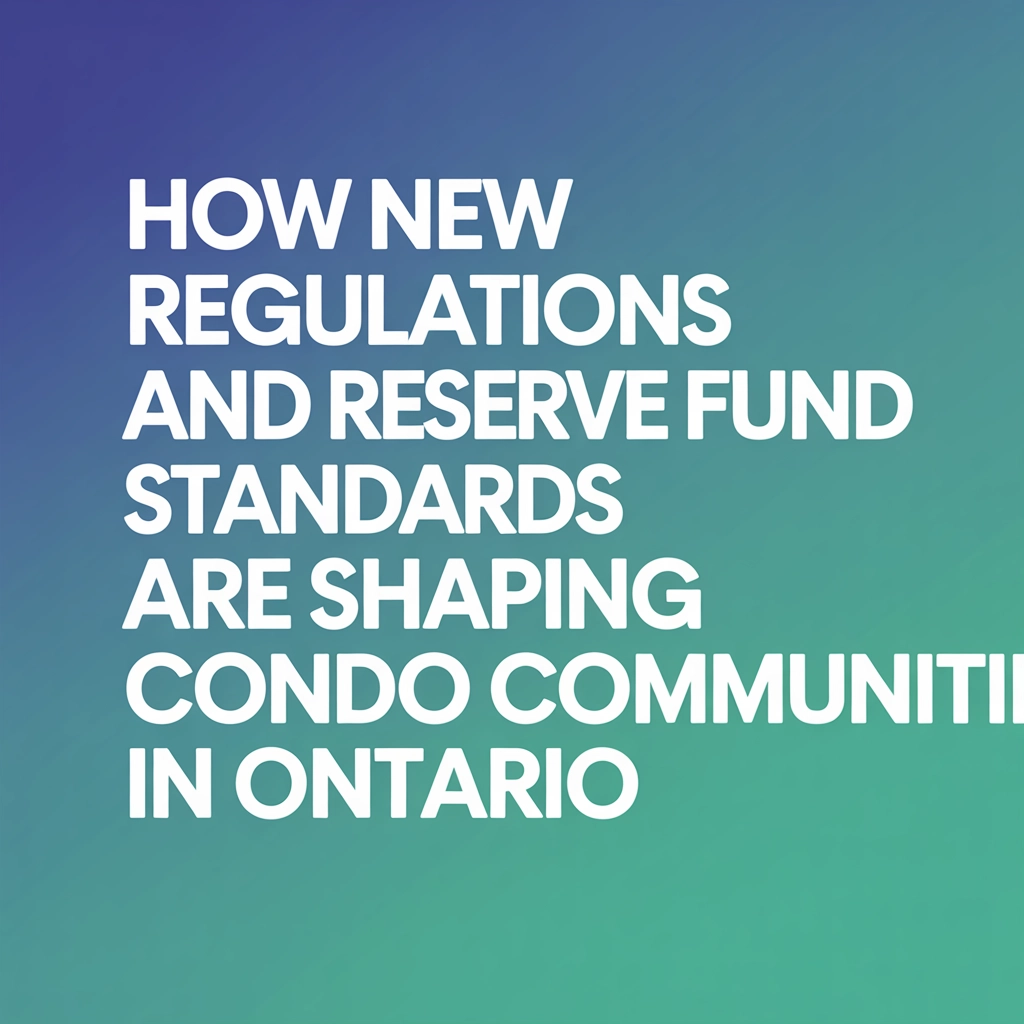The world of Ontario condominiums has seen a remarkable transformation in just the past few years. For anyone living in, managing, or serving on the board of a condo community, the pace and depth of regulatory change has been hard to miss. These shifts don’t just exist in the pages of legal documents—they directly impact how communities are run, how money is handled, and ultimately, the daily lives (and wallets) of condo owners across the province.
A New Era for Ontario Condo Governance
Ontario’s government has been rolling out a steady stream of updates aimed at professionalizing condo management and boosting protections for condo owners. The foundation was set by the Protecting Condominium Owners Act, 2015, which focused on everything from board transparency to dispute resolution. But the changes didn’t stop there.
The introduction of Bill 91 (the Less Red Tape, Stronger Economy Act, 2023), which took effect October 1, 2023, continued the trend—introducing more clarity and expectation around the roles and responsibilities of condo boards, managers, and owners. These legal requirements have pushed all stakeholders to up their game, making community living in condos safer, more transparent, and, ideally, more harmonious.

The Big Change: Reserve Fund Standards Get Real
If you ask any condo board what keeps them up at night, you’ll often hear the term “reserve fund.” A reserve fund is basically a savings account for your building’s future—covering big-ticket repair and replacement costs like roofs, elevators, windows, and more. It’s money set aside so your community isn’t blindsided by major repair bills.
What’s changed? Ontario now enforces some of the strictest reserve fund requirements in the country. The Condominium Act requires that every condo corporation perform a professional reserve fund study every three years. Qualified engineers or other experts evaluate every major building component, estimate its remaining life, and calculate how much should be set aside each year.
Key requirements under Ontario’s current regime:
- Condo corporations must maintain a reserve fund adequate to pay for all major repairs and replacements as forecasted by their reserve fund study.
- The study must be updated every three years to stay current.
- Owners must receive notice about the current status of the reserve fund and any recommended increases to contributions.
- Boards are obligated to act on the recommendations or explain their reasoning to owners.
This consistent, professional planning helps keep buildings in good shape and fees predictably managed.
Why Is This Such a Big Deal?
Protection from the Unexpected
One of the most stressful experiences for condo owners? The dreaded “special assessment”—a sudden, large, often unplanned bill that might run into thousands (or even tens of thousands) of dollars per unit. These typically pop up when a major component needs replacing, and there’s not enough in the reserve fund.
Since Ontario brought in more rigorous standards, the frequency and financial impact of special assessments has dropped considerably. Boards are now compelled to plan ahead and avoid scrambling when a big expense pops up.

Financial Stability for Owners
Before these changes, many boards hesitated to raise monthly fees (nobody likes angry neighbours…), often at the expense of proper funding. Now, with required updates and a spotlight on transparency, fees are more likely to reflect the true needs of the building. This doesn’t mean fees never go up—but it does mean increases are justified, gradual, and explainable.
Plus, precise reserve fund studies help smooth out payments. Rather than a rollercoaster of low fees punctuated by massive one-off charges, most owners now experience steady, manageable contributions year after year.
Board Accountability Has Teeth
With the new regulations, board members don’t just operate on trust. There are real legal consequences for ignoring or mishandling reserve fund responsibilities. If a condo corporation fails to properly fund the reserve, and the building runs into serious financial or safety trouble, board members can face personal liability. In short: the days of “I didn’t know better” are over.
That’s led many boards to seek out professional consultation (good news for property management firms like GIA Property Management!) to ensure they’re making informed, documented decisions in line with both the law and the best interests of owners.
The Balancing Act: Comfort, Maintenance, Value
At first glance, these tighter rules might look like just “more red tape.” But the real-world effect is a greater degree of confidence in Ontario condos—both for residents and for property buyers and sellers.
Here’s why:
- Lenders increasingly review reserve fund studies before approving mortgages for condos. If your building’s fund and plan aren’t up-to-date, buyers may not be able to get financing.
- Well-managed reserve funds mean key building systems are fixed and replaced on time—no more living with a failing roof, unreliable elevators, or unsafe balconies.
- Transparency about upcoming expenses allows for better owner planning and avoids unpleasant surprises.

The Consequences of Cutting Corners
Non-compliance with these regulations isn’t just risky, it’s expensive. Consequences can include:
- Owners being hit with large, unpredictable special assessments.
- Declining building condition, leading to loss of property value and unhappy, vocal residents.
- Legal action against boards that fail in their fiduciary duties.
In today’s market, a poorly funded reserve does more than just annoy residents—it can stop a sale in its tracks or lead to years of headaches for everyone involved.
Data-Driven Management: Why It Matters for Communities
Ontario’s new rules haven’t just imposed more paperwork—they’ve promoted a smarter way to manage a condo’s biggest assets. With updated studies done by professionals every three years, data is always fresh, accurate, and actionable. Tech-savvy boards and management companies use reserve fund data to help inform maintenance schedules, prioritize upgrades, and even support sustainability initiatives.
This proactive approach doesn’t just dodge crisis repair scenarios; it gives owners and boards better visibility into how their money is being used (“yes, that new roof really was necessary!”).

Looking Ahead: A Stronger Community for Everyone
The regulatory changes and reserve fund standards now in place have set a new bar for Ontario, pushing communities towards greater stability, more professional management, and improved long-term value. While transitions like these haven’t been painless—especially for older buildings that needed to play catch-up—the payoff is a more secure, better maintained, and more harmonious condo community for years to come.
If you’re a board facing the challenges of compliance or want expert help managing your building’s finances and maintenance, consider reaching out to the GIA Property Management team. We’re committed to partnering with communities to deliver peace of mind, transparency, and service that goes above and beyond the basics. Ready to talk? Visit our Condominium Management page to learn more.


